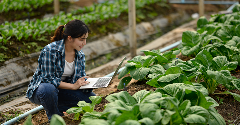News
IFIC study: environmental sustainability is important to consumers
24 Sep 2019Environmental sustainability is top-of-mind for many consumers, but there are sharp differences of beliefs and behaviours between different groups, according to a new survey by the International Food Information Council (IFIC) Foundation.
“Technology, an increasing focus on health and wellness, and consumers’ desires to empower and inform their food decisions are transforming food production and our diets,” said Joseph Clayton, CEO of the IFIC Foundation.

“The Future of Food Summit explores how we can address these changes and channel our knowledge in order to improve the food system and food choices. The IFIC Foundation’s new research is meant to supplement those goals and add to our understanding of consumer attitudes and behaviours.”
The Future of Food Summit brings together thought leaders across academia, agriculture, manufacturing, retail and the media to discuss the future of food and how our food system needs to change for the better. Topics included “The Consumer Experience–Shopping, Cooking & Restaurants,” “Sustainable Food Production,” “Plants to Animals: Where Is Our Protein Obsession Headed?” and “Innovations in Nutrition & Health,” with a keynote address by Ali Bouzari, PhD, co-founder of Pilot R&D and Render.
Last spring, the IFIC Foundation’s 14th annual Food and Health Survey found that 54% of consumers say it’s at least somewhat important that the products they buy be produced in an environmentally sustainable way. The Foundation conducted a follow-up survey to drill down on attitudes and behaviours.
Interestingly, when asked which aspects of an environmentally sustainable diet are important to consumers, “what I eat is healthy for the planet” was the top response, followed by “what I eat is nutritious.” Other factors—such as ingredients people know and recognize, foods that are produced using fewer natural resources, and foods with recyclable packaging—lagged behind.
Among those for whom “healthy for the planet” was a top answer, men outnumbered women (15% vs. 8%) and college graduates outnumbered non-college graduates (17% vs. 8%), while, conversely, people from the Midwest were far less likely to choose that response (just 5%) than other regions (9% in the South, 15% in the Northeast and 17% in the West).
Two-thirds (66%) of consumers think an environmentally sustainable diet can include protein from both animal sources and plant-based sources, while only 10% disagreed. But there was an education gap in the responses, with 73% of college graduates agreeing vs. 62% of non-graduates.
Nonetheless, animal-based proteins dominate our diets, with 92% of respondents report consuming protein from animal sources like meat, dairy, eggs and seafood. Age influences protein consumption: Consumers under 45 years are less likely to consume animal proteins (88%), while those 65 and older are much more likely to do so (98%).
On the other hand, nearly three-quarters (72%) of respondents report consuming protein from plant sources. But here too there was an education gap, with 80% of college graduates saying they consume plant-based proteins vs. 66% of non-college graduates. Taste was far and away the most important factor behind those dietary choices, cited as the top reason of 81% of those who consume animal proteins and by 73% of those who eat plant-based proteins.
When people were asked how much of each source of protein they would need to consume to eat an environmentally sustainable diet, the responses varied: Only one-quarter (27%) said they would need to consume more plant-based protein, while 38% said such a diet would require the same amount of plant protein, and 11% said it would require less.
When it comes to animal protein, one-quarter (26%) said they would need to consume less to attain an environmentally sustainable and healthy diet, while half (53%) said it would require the same amount or more protein from animal sources.
Consumers were also asked what comes to mind when they think of environmentally sustainable animal protein. “No added hormones” topped the list at 50%, followed by “grass-fed animals” (40%) and “locally raised” (32%). Just 21% of respondents associated animals that were fed an organic diet with environmentally sustainable animal protein.
“Environmental sustainability is clearly on the mind of many consumers, but sometimes in ways we might not expect,” Clayton said. “For instance, some consider nutritious food or recognizable ingredients as part of an environmentally sustainable diet.
“The findings also suggest that consumers believe that animal- and plant-based diets can co-exist as sustainable options—particularly in the United States.”
Related news

Digital platform can help optimise the protein quality of plant-based meals
29 Dec 2025
Researchers at Wageningen University have developed a metric to assess – and optimise – the protein quality of plant-based meals.
Read more
Debate over ban on ‘meaty’ names for plant-based products reaches stalemate
26 Dec 2025
The debate over a ban on plant-based products using “meaty” terms has reached a stalemate, leaving manufacturers in limbo and still facing overhauls to their marketing and packaging.
Read more
Our most-read articles of 2025
23 Dec 2025
From trade tariffs to heavy metals in protein, we look back at some of the industry’s highlights of 2025 and round up our most-read stories of the year.
Read more
Bigging up bean-based products and consumption in Britain
19 Dec 2025
Non-profit organisation the Food Foundation has launched a campaign, “Bang in Some Beans”, designed to increase UK consumers’ legume consumption.
Read more
Pioneers of circular plastic packaging push for new policies
18 Dec 2025
Some of the world’s largest food and drink companies have grown frustrated at investing in circular packaging systems, as the majority “wait on the sidelines”.
Read more
Which sustainability-related labels are consumers willing to pay a premium for?
10 Dec 2025
Products with animal welfare and geographic origin labels elicit a higher willingness to pay a premium than those with carbon-related labels, research suggests.
Read more
Sorghum emerges as better-for-you hero ingredient
9 Dec 2025
With the launch of Novak Djokovic’s sorghum-based brand, the grain’s popularity in the better-for-you snacking sphere is on the rise, thanks to its nutritional and sensory properties.
Read more
Innovation promise in 'maturing' plant-based dairy alternatives market
8 Dec 2025
Plant-based dairy is a maturing market that still faces significant hurdles around taste, functionality, nutrition, and price, but industry is innovating fast, according to experts speaking at Fi Europe.
Read more
Celebrating the winners of the Fi Europe Innovation Awards 2025
3 Dec 2025
Food industry stakeholders celebrated as the winners of the Fi Europe Innovation Awards were announced at a ceremony in Paris.
Read more
Yuka’s food scanning app helps consumers make healthier choices
2 Dec 2025
Global food scanning app Yuka helps consumers understand the content of their shopping baskets and shapes producers’ reformulation plans.
Read more